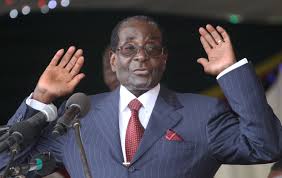…as his failure to liberalise the airwaves chokes economic growth
Charles Mabhena
The reluctance by President Robert Mugabe and his ZANU PF government to open up the airwaves for more radio and television stations in the country is hampering economic growth as much is spent in alternative voices like DSTV, the Reserve Bank of Zimbabwe (RBZ) has revealed.
The revelations came barely two days after the nation joined the global community commemorate the World Radio Day, in the capital where the Information, Media and Broadcasting Minister, Dr Christopher Mushowe was grilled by journalists to explain his government’s refusal to free the airwaves.
Analysts say the move have given Zimbabweans no choice than to resort to DSTV subscriptions amid poor programming by the national broadcaster ZBC, which many have blamed of being Mugabe’s mouthpiece at the expense of national issues.
While, presenting his Monetary Statement for 2017 yesterday, the RBZ boss John Mangudya expressed concern that Zimbabweans have used more money in paying DSTV subscriptions than they did for raw materials; e.g. for producing cooking oil, the move he claim to be counterproductive.
He said a substantial amount of the US$206.7 million, was used for card and DSTV transactions paid through the nostro accounts in a period of six months between July-December 2016.
Mangudya said, card transactions, which require pre funding of 63 nostro accounts were the second largest user (after fuel) of foreign exchange during the second half of the year, as use of hard earned foreign currency in this manner is not sustainable for the economy.
“Spending more foreign exchange on DSTV subscriptions than on raw materials to produce cooking oil, for example, is not only counterproductive but also illogical.
“The Bank shall quickly move to redress this market failure through measures that compel banks to adhere to the import priority list and to mitigate against institutional indiscipline such as the use of more foreign exchange for personal card and DSTV transactions ahead of raw materials to production,” added Mangudya.
The RBZ chief added that financial institutions should do some soul searching and rethink on how they add value to the economy under the new norm, and urged the market players, especially banks, to exercise discipline and rationality in the distribution of foreign exchange amongst the competing needs of the economy.
However, some analysts warn, that for as long as Mugabe suppresses the broadcasting airspace; Zimbabweans would always resort to other alternative voices like paying DSTV at the expense of the economy.
Zimbabwe has been struggling to make foreign payments, the move that have seen the manufacturing sector face challenges in procuring raw materials from outside, with suppliers tightening credit facility conditions.













